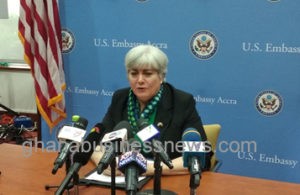US Ambassador Sullivan holds Iftar with Interfaith Community
 United States Ambassador Stephanie S. Sullivan, in keeping with her Embassy’s long-standing tradition has hosted an Iftar dinner at her residence.
United States Ambassador Stephanie S. Sullivan, in keeping with her Embassy’s long-standing tradition has hosted an Iftar dinner at her residence.
Iftar or Fatoor, is the evening meal with which Muslims end their daily fast during Ramadan.
A statement issued by the US Embassy in Accra, on Friday, and copied to the Ghana News Agency, said, Chief Abdul Qadir Tahir, the President of the National Council of Muslim Chiefs, represented the Chief Imam at the event.
The Ameer of the Ahmadiyya Muslim Mission, Maulvi Alhaji Mohammed Bin Salih; the Anglican Archbishop of Accra Diocese and the Most Reverend Daniel Silvanus Mensah Torto, former government officials, leaders of faiths, representatives from various councils, academic institutions, women’s associations, U.S. exchange program alumni, and prominent community leaders and mentors were also at the Iftar.
Ambassador Sullivan praised the National Chief Imam for being a staunch advocate for dialogue and peace, which was most recently evidenced by his visit to the Christ the King Catholic Church, on Easter Sunday, the statement said.
“He has set a new standard for modelling interfaith harmony,” she stated.
Explaining the contribution of Muslims to the American story, Ambassador Sullivan praised Muhammad Ali, the boxing legend, public servants, such as three current Members of the U.S. Congress and former U.S. ambassadors, including the first Muslim U.S. Ambassador Osman Siddique, who she said, swore his oath to the Constitution on the Quran.
She also mentioned award-winning actors, such as Mahershala Ali, Journalist Fareed Zakaria, the first Muslim woman in space, Anousheh Ansari, adding that, there were millions of Muslim Americans who contributed the nation’s development but whose names may never be known.
“Our Islamic brothers and sisters continue to enrich the American fabric, just as being able to spend this evening with all of you enriches my team and me”.
Iftar, the Ambassador said, offered the platform for breaking barriers to build interfaith relationships, partnership and peace for the common good of society.
“It is in that spirit that we have gathered for this interfaith Iftar. Regardless of faith or denomination, religious institutions throughout Ghana play a prominent role in supporting both civic engagement and democratic development.
“They facilitate access to health care, establish schools, and build shelters for vulnerable members of society.
“Representatives of the different faiths are active on local peace councils. They mediate conflicts and intervene when tensions begin to brew, reaching out directly to members of their communities — young and old alike — to keep the peace”.
The US Embassy, Ambassador Sullivan said, thus closely engaged with both Muslim clerics and Christian clergy on addressing corruption, child protection, among others.
Earlier that day, representatives of the Embassy paid visits to the Al-Zakiyya and Gbawe Islamic basic schools and donated food packs, including rice, oil, and canned tomatoes to the students in furtherance of the shared goal of promoting children’s health and education, the statement said.
“One important aspect of Islam, particularly, this time of year, is zakat – or charitable giving”.
Source: GNA
